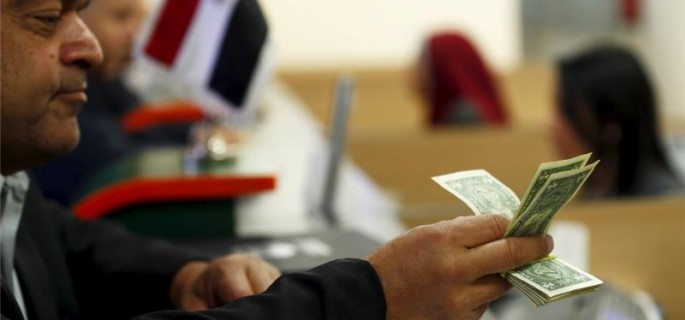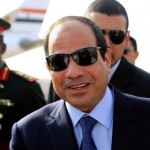Egypt targets higher growth, deficit reduction in new government program

Egypt promised tough action to restore growth on Sunday with a government program that aimed to reduce the budget deficit while protecting the poor as public anger mounts over a deteriorating economy.
Prime Minister Sherif Ismail, reading out a 79-page policy agenda to parliament, said his government would target five to six percent economic growth and push the budget deficit to below 10 percent by the end of fiscal year 2017-18.
Egypt’s economy is currently growing at around 4.2 percent with a budget deficit of about 11.5 percent, Ismail said.
“It is up to us to take several hard decisions that have long been delayed, (but) any economic steps will be accompanied by the requisite social protections,” Ismail said.
He said that the growing population, with the country now 90-million-strong, had strained public services while political instability since the 2011 uprising had hit growth and foreign investment.
The program promises to introduce a long-delayed Value Added Tax (VAT) and push ahead with reforms to the country’s costly subsidies program. It did not give specifics on how those changes would work.
Dozens of unemployed graduate students gathered outside the parliament to protest the government program, flouting a strict protest law that has landed high-profile activists behind bars and which carries a penalty of up to seven years in jail.
President Abdel Fattah al-Sisi has pledged to reduce the jobless rate to 10 percent over the next five years. Unemployment stood at 12.8 percent in December, according to the government. Analysts believe it may be much higher.
“Sisi, the youth are eating dirt … Sherif, what has your government done?” the students shouted while spreading loaves of subsidized bread on the ground atop their masters and doctoral certificates.
A number of difficult reforms have been delayed, from a VAT that would increase government revenues and a civil service law that would trim the country’s public workforce, to an ambitious plan to wean the country off costly energy subsidies that have been scaled back.
Egypt devalued the pound to 8.78 per dollar from 7.73 earlier this month, a move economists said would encourage foreign investment but which risks hitting the country’s poorest through higher inflation, which ran at just over 9.1 percent in February.
Egypt’s parliament will vote on whether to approve the government’s policy agenda. If the parliament rejects the program, it will count as a vote of no confidence against the government. No date has been set for the vote.
Egypt elected its first parliament in more than three years in November. It is dominated by Sisi loyalists.
Source: Reuters
Hopes are that devaluation will resolve Egypt’s dollar crisis, but the situation could spiral out of control.
As Egypt’s economy continues to nosedive, the country has been gripped by a chronic dollar crisis in recent months, exacerbated by falling revenues from tourismand the Suez Canal.
The dollar shortage has fuelled inflation and severely hurt importers and domestic manufacturers who depend on imported raw materials or components. For instance, many imported medicines have become totally unaffordable and there is a shortage inlocally produced generic alternatives due to the inability to import active ingredients.
The hard currency shortage has even affected the black market, with a number of reports in the Arabic media over hours-long searches for dollars at inflated prices.
To tackle the situation and to cool the overheated black market, the Egyptian Central Bank decided, last week, todevalue the Egyptian pound by 13 percent and to sell $198 million to commercial lenders at 8.85 Egyptian pounds to the dollar, from its previous level of 7.73LE.
Egypt’s long-suffering poor
The Cairo stock exchange, along with financial analysts, was jubilant at the news, recording its largest single-day rise, of 7 percent, since July 2013, and ending the week 14 percent up.
However, the effect on Egypt’s long-suffering poor and vulnerable will be far less benign – their underpaid labour has also been devalued.
“Egypt’s poor are enduring the brunt of Egypt’s economic crisis,” observes Timothy Kaldas, a non-resident fellow at the Tahrir Institute for Middle East Policy, in a reference to the high inflation, removal of subsidies, and increased unemployment which have corroded living standards. “The devaluation will undoubtedly increase the cost of certain essential goods, particularly food.”
Continued and worsening hardship for the masses is also bound to hurt the regime. Support for President Abdel Fattah el-Sisi was predicated on his much-hyped capacity to bring Egypt to a safe port of stability and prosperity.
So far, the Sisi regime has demanded of ordinary Egyptians to tighten their belts, while cushioning the wealthy, has given activists and critics a royal belting, and has been unable to keep a rein on spiralling terrorism and insurgency. In addition, despite escalating repression, industrial action continues to sweep across the country.
And this disaffection and instability is bound to grow if the regime delivers only immense pain and no gain.
The Central Bank’s devaluation and loosening of the official exchange rate may not be enough to salvage the situation if Egyptians continue to face dollar shortages and if those receiving remittances from abroad find better prices on the black market, argues Kaldas.
Central Bank Governor Tarek Amer has vowed to do whatever it takes to keep the currency market in check.
Early signs are not promising
However, the early signs are not promising. Despite the devaluation and dollar injections, the Egyptian pound weakened on the black market, reaching 9.55LE to the dollar.
This led financial analysts to expect further cuts in the official rate, with the attendant pain it will cause ordinary Egyptians. JP Morgan forecasts that the Egyptian pound will be devalued by a total of 35 percent this year, with a projected inflation of 14 percent.
And, as has been demonstrated elsewhere in the world umpteen times in the past, the situation could easily spiral out of control, if these measures elicit panic rather than confidence, or if speculators run the Egyptian pound into the ground.
Beyond Egypt’s specific economic woes and poor governance, this points at a deeper, wider malaise: how the global trading system is stacked and loaded against smaller economies.
The main reason Egypt is suffering from a “dollar crisis”, along with other countries, is because the US dollar is the world’s dominant reserve currency and the main medium of international trade, though the euro has closed the gap in recent years.
Obliging smaller and poorer economies to trade in the dollar and other reserve currencies makes them vulnerable to the whims of the currency markets and forex speculators.
In addition, the dollar and euro distort trade in favour of the United States and Europe, enabling them to import and borrow far more cheaply than their fundamentals should allow.
But there are downsides for top-dog economies, such as making their exports less competitive and the inevitable trade deficits caused by the “Triffin Dilemma”.
The unnaturally low cost of credit has played a central role in the US’s dangerously high public debt – on which it has come perilously close to defaulting – and contributed to the US subprime crisis and the European sovereign debt crisis.
The solution to this, in my humble view, is the introduction of a single global currency for the purposes of international trade is. This would help remove the volatility of currency markets, end speculation, eliminate the currency black markets, and even the global economic playing field.
This is not a new idea. John Maynard Keynes, the British economist, proposed just such a currency as the lynchpin of the post-war economic order, but was torpedoed by American opposition. Following the volatility and crises that have afflicted the global economy in recent years, China, Russia and other emerging powers have also called for just such currency reform.
A world currency would not only help stabilise and boost the global economy, it would also reduce the social fallout caused by dollar shortages and the immense inflationary pressures they create.
Source: Aljazeera




























